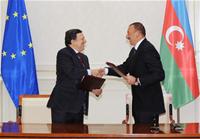Barroso is looking for Caspian gas for Europe
Dessislava Dimitrova, January 18, 2011
 „А major breakthrough” – that is how the President of the European Commission Barroso described the agreement signed on Thursday in Baku between Azerbaijan and the European Union, according to which the EU would directly receive Azeri gas for the Southern Gas Corridor. Barroso and Azerbaijan’s President Ilham Aliyev signed a declaration, in which Azerbaijan and the Commission establish a common objective: Azerbaijan will provide sufficient gas to enable the creation of the Southern Corridor. Together, Europe and Azerbaijan will provide the infrastructure for gas supply to Europe from the Shah Deniz 2 deposit, as well as other deposits in the country.
„А major breakthrough” – that is how the President of the European Commission Barroso described the agreement signed on Thursday in Baku between Azerbaijan and the European Union, according to which the EU would directly receive Azeri gas for the Southern Gas Corridor. Barroso and Azerbaijan’s President Ilham Aliyev signed a declaration, in which Azerbaijan and the Commission establish a common objective: Azerbaijan will provide sufficient gas to enable the creation of the Southern Corridor. Together, Europe and Azerbaijan will provide the infrastructure for gas supply to Europe from the Shah Deniz 2 deposit, as well as other deposits in the country.
”This agreement confirms Europe's direct access to gas from the Caspian basin, thus enabling the realisation of the Southern Corridor. This new supply route will enhance the energy security of European consumers and businesses,” Barroso said in a statement upon the signing of the deal.
Although no details have been revealed, according to Azeri Internet portal  AZE.az in the coming years the natural gas output in the country is expected to increase and Azerbaijan will have to sell the exceeding resources on international markets. The projections are that this year the natural gas output will exceed 30 billion cubic metres, while in 2018 it will reach 80 billion cubic metres.
AZE.az in the coming years the natural gas output in the country is expected to increase and Azerbaijan will have to sell the exceeding resources on international markets. The projections are that this year the natural gas output will exceed 30 billion cubic metres, while in 2018 it will reach 80 billion cubic metres.
Last September Russia’s gas monopoly Gazprom signed a deal with Azeri state-owned gas company for the purchase of natural gas, according to which its volume would double to 2.0 billion cubic metres in 2011, while in 2012 it would exceed this level. The deal was then defined as Moscow’s attempt to hinder the implementation of the Nabucco project, thus securing an advantage for its own projects – Nord Stream and South Stream.
Azerbaijan is considered to be the main supplier to the EU-backed Nabucco project, which aims to cut Europe’s dependence on Russian gas supplies. As an extension of the Baku-Tbilisi-Erzurum pipeline it will reach southeastern Europe via Turkey and then go to Austria. The agreement for the transit of natural gas via Turkey was signed in July 2009 and last August the Nabucco pipeline project company said that there would be a feeder line to the Turkish-Georgian border and to the Turkish-Iraqi border and that it was not planning a third one to the Turkish-Iranian border so far.
By end-March Azerbaijan is expected to decide whether Nabucco will be the main receiver of Azeri gas from the Shah Deniz II field. The Southern corridor entails the construction of several pipelines, such as ITGI, White Stream and TAP, aiming to bring gas from the Caspian Sea to Europe, securing independence from Russia.
All managing consortia of all these projects hope to get gas from the Caspian sea, but unlike Nabucco which aims to bring gas to the border of Europe via a brand new pipeline, TAP and ITGI requires the strengthening of existing infrastructure in non-EU countries, which makes them cheaper. For comparison, Nabucco is estimated to cost 7.9 billion euro, whereas TAP is estimated to cost 1.5 billion euro and the TAP price is estimated at 3.4 billion euro. Last September media reports had it that TAP and ITGI shareholders were negotiating about potential cooperation between them.
Recently Italian media reported that Nabucco and South Stream, seen as its main competitor, could merge into a single project. Italian daily La Stampa quoted David Thorne, the US ambassador to Italy, as saying that Italy’s energy major Eni  (Gazprom’ main partner in South Stream), was considering such an option. Eni’s CEO, Paolo Scaroni, however, denied the possibility for such a convergence, as “Nabucco is behind schedule”. At the same time he announced that the South Stream project remains open for new participants in it.
(Gazprom’ main partner in South Stream), was considering such an option. Eni’s CEO, Paolo Scaroni, however, denied the possibility for such a convergence, as “Nabucco is behind schedule”. At the same time he announced that the South Stream project remains open for new participants in it.
Following the “breakthrough” in Baku, Barroso and EU Energy Commissioner Guenther Oettinger, continued the talks in Turkmenistan.